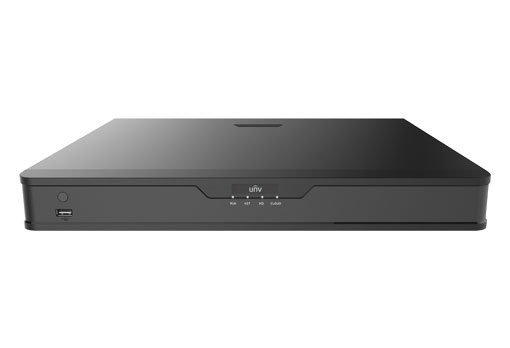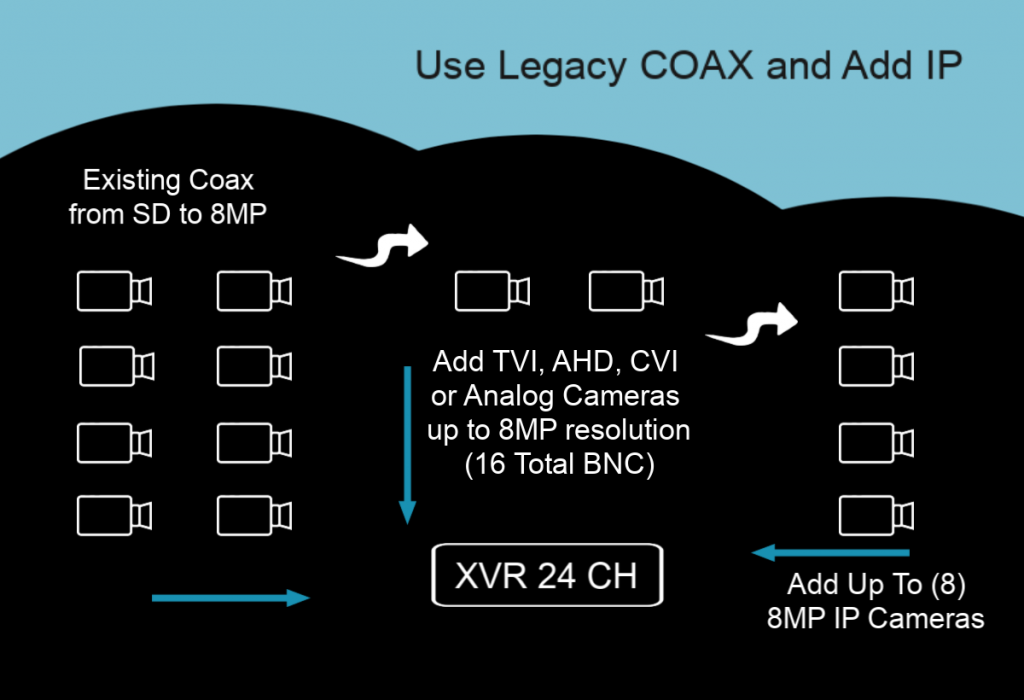
What is an XVR?
Well you have heard of DVRs and NVRs, but what is an XVR? Well, we would say that an XVR Recorder is basically a DVR on steroids (but in a good way). A DVR (Digital Video Recorder) is a device used for recording and processing HD Analog or SD Analog Security Cameras. Meanwhile, an NVR (Network Video Recorder) is the device used for IP Cameras. Enter the XVR, a device that is able to record and display both HD and IP Cameras for maximum scalability. While an NVR will still be the best choice for most applications using all IP Cameras, XVRs have taken HD recording into a new dimension. In addition, XVR Recorders like the Uniview NVR302-16Q, can support all common HD Video Formats including TVI, AHD, CVI and CVBS. Therefore the recorder is compatible with the vast majority of cameras regardless of manufacturer or format.
Highest Compatibility Range
Supports TVI, AHD, CVI and CVBS Formats as well as IP Cameras.
What is the difference between an XVR and a DVR?
DVR Recorders are designed to process and record Analog Video Signals. They are used with Standard Definition or High Definition Security Cameras predominantly over Coax Cable or RG59. Some DVRs only support one format such as AHD or TVI. However, there are a number of ‘Hybrid’ DVR’s that can do multiple formats and accept a variety of Cameras using different signal formats at once. An XVR, on the other hand, takes that one step further. These Recorders will generally do all common HD over COAX formats, as well as supporing IP Cameras. This adds an interesting dimension to standard recorders and delivers an unmatched flexibility.
Example of XVR with 24 Channel Operation:
Is an XVR More Expensive?
Nope! The price is generally comparable to DVR pricing. Many major manufacturers have gone to producing either Hybrid DVRs or XVRs instead of standard DVRs and pricing has reflected this.
Why should I get an XVR?
Upgrading New Clients
If you are a Security Camera Installer and have a customer with legacy Analog or HD Analog Cameras, an XVR will provide more solution options without a customer having to replace existing equipment. Lets say that your customer has a 8 Channel DVR with (6) HD 1080P 2MP Cameras. For our example, lets assume that your customer wants higher resolution cameras or even wants to add IP Cameras. The need for higher resolution is obviously a common one. However, a potential client may also have a unique or specific need that only an IP Camera will provide. Of course, you could tell them to scrap their existing system, or try to install an NVR with expensive encoders, but that might be cost prohibitive. As an alternative, you could propose an XVR. This would allow using the customers (6) existing cameras as well as adding cameras of any format you choose. In addition you will be able to add several IP Cameras that solve your customers issue.
Bidding or Planning a Security Camera Application
Being more competitive when bidding a job, or being able to offer an alternative solution, is a good way to earn a clients trust. To take this one step further, installing an XVR will prevent you from being limited on camera options in the future. Whether you are installing the unit for a client, or you are an end user, you can rest assured that your system will be scalable for future expansion and variety of camera use.
If you are looking at upgrading your DVR or interested in a new Security Camera System, you should consider the following Video Recorders:
What XVR’s are available?
NVR302-16Q Uniview 16/24 Channel XVR
SAS-XVR51600 Stoic 16 Channel XVR
SAS-XVR5800 Stoic 8 Channel XVR
SAS-XVR5400 Stoic 4 Channel XVR
Also see our post on “How do I add IP Cameras to my DVR, XVR?”
Ellipse Security Distributors has been a supplier to the CCTV, Surveillance Industry since 2004.
Questions about your next Surveillance Project? Give us a call Toll-Free at 877-880-7728!



